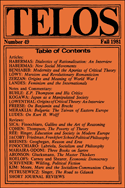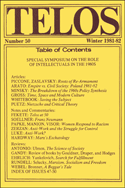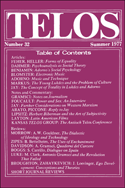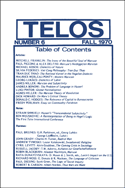By J. F. Dorahy · Tuesday, May 14, 2013 As an occasional feature on TELOSscope, we highlight a past Telos article whose critical insights continue to illuminate our thinking and challenge our assumptions. Today, J. F. Dorahy looks at Seyla Benhabib’s “Modernity and the Aporias of Critical Theory,” from Telos 49 (Fall 1981).
 The critical theory of the Frankfurt School begins with Max Weber. With this claim I do not mean to suggest that Weber was the first critical theorist—as is well known, Hegel, Marx, and Nietzsche, each of whom wrote before Weber and had enormous influence on the Frankfurt School, are, to a greater or lesser extent, critical theorists. Rather, what this assertion draws attention to is the perspectival significance that Weber’s analysis of modernity holds for not only the first generation of the Frankfurt School—Adorno, Horkheimer, and Marcuse—but also for Habermas. In the last few decades, particularly in the highly influential and groundbreaking work of Axel Honneth, the Weberian diagnosis of modernity has lost its orientating position for critical theory. In its place stands the Hegelian notion of intersubjective recognition; subsequently, the once decisive notions of “rationalization” and “disenchantment” have given way, in contemporary critical theory, to the notions of “paradoxical development” and “disrespect.” Certainly, the socio-historical developments of the late twentieth and early twenty-first centuries bring into question the project and function of critical theory. So, too, the reflexive nature of the discourse necessitates the re-evaluation of its guiding concepts. Yet, many theorists have expressed significant reservations about the trajectory of contemporary critical theory, a trajectory that, in the words of Nikolas Kompridis, has veered “from reason to self-realization.” Perhaps, then, given the contemporary debate regarding the future directions of critical theory, the time is appropriate to revisit the history of critical theory and examine its variegated responses to the irrationality of modern reason. The critical theory of the Frankfurt School begins with Max Weber. With this claim I do not mean to suggest that Weber was the first critical theorist—as is well known, Hegel, Marx, and Nietzsche, each of whom wrote before Weber and had enormous influence on the Frankfurt School, are, to a greater or lesser extent, critical theorists. Rather, what this assertion draws attention to is the perspectival significance that Weber’s analysis of modernity holds for not only the first generation of the Frankfurt School—Adorno, Horkheimer, and Marcuse—but also for Habermas. In the last few decades, particularly in the highly influential and groundbreaking work of Axel Honneth, the Weberian diagnosis of modernity has lost its orientating position for critical theory. In its place stands the Hegelian notion of intersubjective recognition; subsequently, the once decisive notions of “rationalization” and “disenchantment” have given way, in contemporary critical theory, to the notions of “paradoxical development” and “disrespect.” Certainly, the socio-historical developments of the late twentieth and early twenty-first centuries bring into question the project and function of critical theory. So, too, the reflexive nature of the discourse necessitates the re-evaluation of its guiding concepts. Yet, many theorists have expressed significant reservations about the trajectory of contemporary critical theory, a trajectory that, in the words of Nikolas Kompridis, has veered “from reason to self-realization.” Perhaps, then, given the contemporary debate regarding the future directions of critical theory, the time is appropriate to revisit the history of critical theory and examine its variegated responses to the irrationality of modern reason.
Continue reading →
By J. F. Dorahy · Tuesday, April 16, 2013 As an occasional feature on TELOSscope, we highlight a past Telos article whose critical insights continue to illuminate our thinking and challenge our assumptions. Today, J. F. Dorahy looks at Joel Whitebook’s “Saving the Subject: Modernity and the Problem of the Autonomous Individual,” from Telos 50 (Winter 1981).
 Autonomy is, arguably, the most fundamental concept in the discursive constellation of modernity. If it is apposite, and I believe it is, to think in terms of the differentiation between political, socio-economic, and cultural modernities, then it is clear that the concept of autonomy—either with reference to the autonomous individual or the autonomous work of art—is a constitutive force within each sphere. In “Saving the Subject: Modernity and the Problem of the Autonomous Individual,” Joel Whitebook offers a historically nuanced overview of the difficulties involved in thinking the “autonomous individual” under the conditions of a dynamic and increasingly complex modernity. Whitebook’s piece is wide-ranging and fuses a deep psychoanalytic insight with a robust sociological consciousness: a fusion that accompanies, to my mind, the best critical theory. To be sure, the many subtleties and divergences that emerge from Whitebook’s dialectic are resistant to a full reconstruction within this preview. Rather, I would like to simplify Whitebook’s account by drawing out the three historical epochs examined by Whitebook and say a few things regarding the key aspects of Whitebook’s reading of Marx and Freud and Adorno and Habermas as thinkers who most significantly appreciate the problematic nature of the modern, autonomous individual. Finally, I conclude by arguing for the innovative character of Whitebook’s thoughts regarding the centrality of affective relationships in the formation of the autonomous individual. Autonomy is, arguably, the most fundamental concept in the discursive constellation of modernity. If it is apposite, and I believe it is, to think in terms of the differentiation between political, socio-economic, and cultural modernities, then it is clear that the concept of autonomy—either with reference to the autonomous individual or the autonomous work of art—is a constitutive force within each sphere. In “Saving the Subject: Modernity and the Problem of the Autonomous Individual,” Joel Whitebook offers a historically nuanced overview of the difficulties involved in thinking the “autonomous individual” under the conditions of a dynamic and increasingly complex modernity. Whitebook’s piece is wide-ranging and fuses a deep psychoanalytic insight with a robust sociological consciousness: a fusion that accompanies, to my mind, the best critical theory. To be sure, the many subtleties and divergences that emerge from Whitebook’s dialectic are resistant to a full reconstruction within this preview. Rather, I would like to simplify Whitebook’s account by drawing out the three historical epochs examined by Whitebook and say a few things regarding the key aspects of Whitebook’s reading of Marx and Freud and Adorno and Habermas as thinkers who most significantly appreciate the problematic nature of the modern, autonomous individual. Finally, I conclude by arguing for the innovative character of Whitebook’s thoughts regarding the centrality of affective relationships in the formation of the autonomous individual.
Continue reading →
By J. F. Dorahy · Tuesday, March 5, 2013 As an occasional feature on TELOSscope, we highlight a past Telos article whose critical insights continue to illuminate our thinking and challenge our assumptions. Today, J.F. Dorahy looks at György Márkus’s “The Soul and Life: The Young Lukács and the Problem of Culture,” from Telos 32 (Summer 1977).
 György Márkus’s essay on Lukács, “The Soul and Life,” is a seminal insight into one of the most influential philosophical oeuvres of the twentieth century. This piece, published at a time when only a handful of Márkus’s papers were available to English-language readers, reflects an intimacy with Lukács’s aesthetics that is unsurpassed in Lukács scholarship. (Márkus jointly edited, along with Frank Benesler, Lukács’s posthumously published Heidelberger Philosophie der Kunst 1916–18 and the Heidelberger Ästhetik 1916–1918, works that figure prominently in the essay under consideration.) The discussion in “The Soul and Life” centers on the problem of the possibility of culture as treated by Lukács in his pre-1918, or pre-Marxist, writings. György Márkus’s essay on Lukács, “The Soul and Life,” is a seminal insight into one of the most influential philosophical oeuvres of the twentieth century. This piece, published at a time when only a handful of Márkus’s papers were available to English-language readers, reflects an intimacy with Lukács’s aesthetics that is unsurpassed in Lukács scholarship. (Márkus jointly edited, along with Frank Benesler, Lukács’s posthumously published Heidelberger Philosophie der Kunst 1916–18 and the Heidelberger Ästhetik 1916–1918, works that figure prominently in the essay under consideration.) The discussion in “The Soul and Life” centers on the problem of the possibility of culture as treated by Lukács in his pre-1918, or pre-Marxist, writings.
Continue reading →
By J. F. Dorahy · Tuesday, January 15, 2013 As an occasional feature on TELOSscope, we highlight a past Telos article whose critical insights continue to illuminate our thinking and challenge our assumptions. Today, J. F. Dorahy looks at Agnes Heller’s “The Marxist Theory of Revolution and the Revolution of Everyday Life,” from Telos 6 (Fall 1970).
 The category of “everyday life” is a relatively new addition to the critical framework of Marxism. Since it was formally introduced by the French theorist Henri Lefèbvre (Critique de la vie quotidienne I, 1947; The Critique of Everyday Life, 1991), the critique of everyday life emerged in the post-1945 period as a response to the continuing stability of late capitalism and the integration of formerly radical elements of society within its logic of containment. From within the orbit of “actually existing socialism,” Agnes Heller’s critical anthropology of everyday life illuminates the integrative tendencies of both “great systems” during the Cold War via the prism of the alienated personality. While “The Marxist Theory of Revolution and the Revolution of Everyday Life” touches on numerous practical issues confronting the radical political movements on the late-1960s—including analysis of the ideological relevance of Che Guevara and the role of the sexual liberation movement in the formation non-alienated communities—its greatest and most enduring aspect is Heller’s focused and concise delineation of the phenomenology of personhood in the world-historical epoch of alienation. The category of “everyday life” is a relatively new addition to the critical framework of Marxism. Since it was formally introduced by the French theorist Henri Lefèbvre (Critique de la vie quotidienne I, 1947; The Critique of Everyday Life, 1991), the critique of everyday life emerged in the post-1945 period as a response to the continuing stability of late capitalism and the integration of formerly radical elements of society within its logic of containment. From within the orbit of “actually existing socialism,” Agnes Heller’s critical anthropology of everyday life illuminates the integrative tendencies of both “great systems” during the Cold War via the prism of the alienated personality. While “The Marxist Theory of Revolution and the Revolution of Everyday Life” touches on numerous practical issues confronting the radical political movements on the late-1960s—including analysis of the ideological relevance of Che Guevara and the role of the sexual liberation movement in the formation non-alienated communities—its greatest and most enduring aspect is Heller’s focused and concise delineation of the phenomenology of personhood in the world-historical epoch of alienation.
Continue reading →
By J. F. Dorahy · Monday, December 31, 2012 As an occasional feature on TELOSscope, we highlight a past Telos article whose critical insights continue to illuminate our thinking and challenge our assumptions. Today, J. F. Dorahy looks at Georg Lukács’s “The Dialectic of Labor: Beyond Causality and Teleology,” from Telos 6 (Fall 1970).
 Georg Lukács’s essay “The Dialectic of Labor” belongs to the last period of his life and was composed in the context of the so-called “renaissance of Marxism”: a movement, beginning in the mid-1950s, within several of the Eastern Bloc nations—most notably Hungary, Poland, and the former Yugoslavia—that sought to re-energize the humanistic dimensions of Marxism suppressed by the enforcement of orthodoxy. Lukács’s substantive contribution to the “renaissance of Marxism” took the form of two enormous projects: a Marxist ontology (Zur Ontologie des gesellschaftichen Seins) and a systematic aesthetics (Die Eigenart des Ästhetischen). Although Lukács’s relationship to “dialectical and historical materialism” remains complex, “The Dialectic of Labor” stands as a reflection of this humanistic tendency inasmuch as it, by way of an ontological elucidation of the “philosophy of praxis,” emphasizes the functional role of subjectivity as a constitutive moment in the social-historical process. Georg Lukács’s essay “The Dialectic of Labor” belongs to the last period of his life and was composed in the context of the so-called “renaissance of Marxism”: a movement, beginning in the mid-1950s, within several of the Eastern Bloc nations—most notably Hungary, Poland, and the former Yugoslavia—that sought to re-energize the humanistic dimensions of Marxism suppressed by the enforcement of orthodoxy. Lukács’s substantive contribution to the “renaissance of Marxism” took the form of two enormous projects: a Marxist ontology (Zur Ontologie des gesellschaftichen Seins) and a systematic aesthetics (Die Eigenart des Ästhetischen). Although Lukács’s relationship to “dialectical and historical materialism” remains complex, “The Dialectic of Labor” stands as a reflection of this humanistic tendency inasmuch as it, by way of an ontological elucidation of the “philosophy of praxis,” emphasizes the functional role of subjectivity as a constitutive moment in the social-historical process.
Continue reading →
|
|
 The critical theory of the Frankfurt School begins with Max Weber. With this claim I do not mean to suggest that Weber was the first critical theorist—as is well known, Hegel, Marx, and Nietzsche, each of whom wrote before Weber and had enormous influence on the Frankfurt School, are, to a greater or lesser extent, critical theorists. Rather, what this assertion draws attention to is the perspectival significance that Weber’s analysis of modernity holds for not only the first generation of the Frankfurt School—Adorno, Horkheimer, and Marcuse—but also for Habermas. In the last few decades, particularly in the highly influential and groundbreaking work of Axel Honneth, the Weberian diagnosis of modernity has lost its orientating position for critical theory. In its place stands the Hegelian notion of intersubjective recognition; subsequently, the once decisive notions of “rationalization” and “disenchantment” have given way, in contemporary critical theory, to the notions of “paradoxical development” and “disrespect.” Certainly, the socio-historical developments of the late twentieth and early twenty-first centuries bring into question the project and function of critical theory. So, too, the reflexive nature of the discourse necessitates the re-evaluation of its guiding concepts. Yet, many theorists have expressed significant reservations about the trajectory of contemporary critical theory, a trajectory that, in the words of Nikolas Kompridis, has veered “from reason to self-realization.” Perhaps, then, given the contemporary debate regarding the future directions of critical theory, the time is appropriate to revisit the history of critical theory and examine its variegated responses to the irrationality of modern reason.
The critical theory of the Frankfurt School begins with Max Weber. With this claim I do not mean to suggest that Weber was the first critical theorist—as is well known, Hegel, Marx, and Nietzsche, each of whom wrote before Weber and had enormous influence on the Frankfurt School, are, to a greater or lesser extent, critical theorists. Rather, what this assertion draws attention to is the perspectival significance that Weber’s analysis of modernity holds for not only the first generation of the Frankfurt School—Adorno, Horkheimer, and Marcuse—but also for Habermas. In the last few decades, particularly in the highly influential and groundbreaking work of Axel Honneth, the Weberian diagnosis of modernity has lost its orientating position for critical theory. In its place stands the Hegelian notion of intersubjective recognition; subsequently, the once decisive notions of “rationalization” and “disenchantment” have given way, in contemporary critical theory, to the notions of “paradoxical development” and “disrespect.” Certainly, the socio-historical developments of the late twentieth and early twenty-first centuries bring into question the project and function of critical theory. So, too, the reflexive nature of the discourse necessitates the re-evaluation of its guiding concepts. Yet, many theorists have expressed significant reservations about the trajectory of contemporary critical theory, a trajectory that, in the words of Nikolas Kompridis, has veered “from reason to self-realization.” Perhaps, then, given the contemporary debate regarding the future directions of critical theory, the time is appropriate to revisit the history of critical theory and examine its variegated responses to the irrationality of modern reason.  Autonomy is, arguably, the most fundamental concept in the discursive constellation of modernity. If it is apposite, and I believe it is, to think in terms of the differentiation between political, socio-economic, and cultural modernities, then it is clear that the concept of autonomy—either with reference to the autonomous individual or the autonomous work of art—is a constitutive force within each sphere. In “Saving the Subject: Modernity and the Problem of the Autonomous Individual,” Joel Whitebook offers a historically nuanced overview of the difficulties involved in thinking the “autonomous individual” under the conditions of a dynamic and increasingly complex modernity. Whitebook’s piece is wide-ranging and fuses a deep psychoanalytic insight with a robust sociological consciousness: a fusion that accompanies, to my mind, the best critical theory. To be sure, the many subtleties and divergences that emerge from Whitebook’s dialectic are resistant to a full reconstruction within this preview. Rather, I would like to simplify Whitebook’s account by drawing out the three historical epochs examined by Whitebook and say a few things regarding the key aspects of Whitebook’s reading of Marx and Freud and Adorno and Habermas as thinkers who most significantly appreciate the problematic nature of the modern, autonomous individual. Finally, I conclude by arguing for the innovative character of Whitebook’s thoughts regarding the centrality of affective relationships in the formation of the autonomous individual.
Autonomy is, arguably, the most fundamental concept in the discursive constellation of modernity. If it is apposite, and I believe it is, to think in terms of the differentiation between political, socio-economic, and cultural modernities, then it is clear that the concept of autonomy—either with reference to the autonomous individual or the autonomous work of art—is a constitutive force within each sphere. In “Saving the Subject: Modernity and the Problem of the Autonomous Individual,” Joel Whitebook offers a historically nuanced overview of the difficulties involved in thinking the “autonomous individual” under the conditions of a dynamic and increasingly complex modernity. Whitebook’s piece is wide-ranging and fuses a deep psychoanalytic insight with a robust sociological consciousness: a fusion that accompanies, to my mind, the best critical theory. To be sure, the many subtleties and divergences that emerge from Whitebook’s dialectic are resistant to a full reconstruction within this preview. Rather, I would like to simplify Whitebook’s account by drawing out the three historical epochs examined by Whitebook and say a few things regarding the key aspects of Whitebook’s reading of Marx and Freud and Adorno and Habermas as thinkers who most significantly appreciate the problematic nature of the modern, autonomous individual. Finally, I conclude by arguing for the innovative character of Whitebook’s thoughts regarding the centrality of affective relationships in the formation of the autonomous individual.  György Márkus’s essay on Lukács, “The Soul and Life,” is a seminal insight into one of the most influential philosophical oeuvres of the twentieth century. This piece, published at a time when only a handful of Márkus’s papers were available to English-language readers, reflects an intimacy with Lukács’s aesthetics that is unsurpassed in Lukács scholarship. (Márkus jointly edited, along with Frank Benesler, Lukács’s posthumously published Heidelberger Philosophie der Kunst 1916–18 and the Heidelberger Ästhetik 1916–1918, works that figure prominently in the essay under consideration.) The discussion in “The Soul and Life” centers on the problem of the possibility of culture as treated by Lukács in his pre-1918, or pre-Marxist, writings.
György Márkus’s essay on Lukács, “The Soul and Life,” is a seminal insight into one of the most influential philosophical oeuvres of the twentieth century. This piece, published at a time when only a handful of Márkus’s papers were available to English-language readers, reflects an intimacy with Lukács’s aesthetics that is unsurpassed in Lukács scholarship. (Márkus jointly edited, along with Frank Benesler, Lukács’s posthumously published Heidelberger Philosophie der Kunst 1916–18 and the Heidelberger Ästhetik 1916–1918, works that figure prominently in the essay under consideration.) The discussion in “The Soul and Life” centers on the problem of the possibility of culture as treated by Lukács in his pre-1918, or pre-Marxist, writings.  The category of “everyday life” is a relatively new addition to the critical framework of Marxism. Since it was formally introduced by the French theorist Henri Lefèbvre (Critique de la vie quotidienne I, 1947; The Critique of Everyday Life, 1991), the critique of everyday life emerged in the post-1945 period as a response to the continuing stability of late capitalism and the integration of formerly radical elements of society within its logic of containment. From within the orbit of “actually existing socialism,” Agnes Heller’s critical anthropology of everyday life illuminates the integrative tendencies of both “great systems” during the Cold War via the prism of the alienated personality. While “The Marxist Theory of Revolution and the Revolution of Everyday Life” touches on numerous practical issues confronting the radical political movements on the late-1960s—including analysis of the ideological relevance of Che Guevara and the role of the sexual liberation movement in the formation non-alienated communities—its greatest and most enduring aspect is Heller’s focused and concise delineation of the phenomenology of personhood in the world-historical epoch of alienation.
The category of “everyday life” is a relatively new addition to the critical framework of Marxism. Since it was formally introduced by the French theorist Henri Lefèbvre (Critique de la vie quotidienne I, 1947; The Critique of Everyday Life, 1991), the critique of everyday life emerged in the post-1945 period as a response to the continuing stability of late capitalism and the integration of formerly radical elements of society within its logic of containment. From within the orbit of “actually existing socialism,” Agnes Heller’s critical anthropology of everyday life illuminates the integrative tendencies of both “great systems” during the Cold War via the prism of the alienated personality. While “The Marxist Theory of Revolution and the Revolution of Everyday Life” touches on numerous practical issues confronting the radical political movements on the late-1960s—including analysis of the ideological relevance of Che Guevara and the role of the sexual liberation movement in the formation non-alienated communities—its greatest and most enduring aspect is Heller’s focused and concise delineation of the phenomenology of personhood in the world-historical epoch of alienation. 

